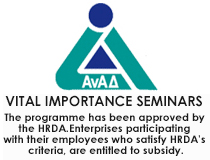Foster Productivity & Growth Potential with Innovative Customer Service Delivery

Instructor
-
 Philippe LeliaertConsultant/Coach/Trainer
Philippe LeliaertConsultant/Coach/TrainerDr. Philippe Leliaert is an associate consultant of Ackinas bvba (management consulting group specialising in Process Performance, eLearning and Intellectual Capital Management); senior Organisational Effectiveness Consultant at The Sinclair Group (US-based consulting group specialising in Operational Excellence), senior consultant and member of the Advisory Board at ContentAdvisors (consulting group focused on Knowledge Management), Owner-manager of management consulting firm L-Consult bvba, and co-founder of the international consulting network Syntaxis Networking.
His consulting expertise focuses on organisational development & change as the industrial economy evolves into a knowledge-based economy. He provides management advice at both strategic and operational/implementation levels on the organisational impact of e-Business/the knowledge economy. He further advises on the development, introduction and management of knowledge processes (creativity & innovation; Communities of Practice) as the only sources of sustainable competitive advantage, and on the identification, measurement and management of Intellectual Capital value.
He is active in several European Networks of Excellence related to knowledge & intellectual capital management, including PRISM, NESKEY and KnowledgeBoard. He was recently a keynote speaker at the 5th European Conference on Intellectual Capital.
His client list includes, among others:
– Strategy formulation, development, and implementation (using amongst other the Balanced Scorecard model) at Belgacom (telecom operator), Union Minière (non-ferro metals), Siemens Building Technologies (security services), Xylos (IT & Training), BASF (petrochemicals), Ackinas (management consulting),
– process performance measurement & change management at Hays Logistics Europe (logistics), Mercedes-Benz Europa (automotive), Janssens Pharmaceutica and Medochemie Cyprus (pharmaceuticals), Mercator Group (insurance), HP Consulting Europe and BaaN Belgium (IT), Xylos (IT & Training), Telindus (ICT); Telenet Vlaanderen (telecom operator); Kone Europe (elevators); Ericsson Nanjing (electronics); Laiki Bank and Hellenic Bank (financial services)
– Knowledge & Intellectual Capital Management at ODG Toronto (consulting & Value Added Reseller), KBC bank and ING Carlease (financial services), Sharelink Nicosia (financial services), Leptos Cyprus (real estate), Bank of Cyprus and Hellenic Bank (financial services)

Recent Participants

Date
- Mar 07 - 09 2018
- Expired!
Cost
- Fully Subsidized
Location
The programme includes:
- Two full-days seminar at a luxurious venue.
- Half a day consulting session for each participating company.
- An extensive report for each participating company formulated to their needs. The report will include recommendations and suggestions for further consideration by the management.
- Full access to a seminar blog containing all presentations and further additional support materials and resources for each seminar participant.
- Full lunch and three coffee breaks for the two-days seminar for each seminar participant.
- No VAT is imposed to Digipro Executive Management Seminars. Please contact us for clarifications.
SME customer service delivery is the most important function. Yet, companies have significant problems in this area:
- Often failing to meet customer expectations, rarely exceeding expectations.
- Over-servicing clients – dedicating resources to deliver not-valued services.
- Not considering the cost to service customers
- Not recognising differences among strategic segments thus providing one-fit-all solutions.
- The company’s operating model not supporting adequately customer servicing.
In order to deal with the issues identified above small firms must introduce significant innovations in customer service delivery:
- Recognise the value of different strategic segments to the firm and understand each segment’s expectations across all interaction points with the company.
- Build value propositions that recognize district buyer values across the servicing process.
- Identify gaps in the service delivery model, identify areas of improvement and develop priorities.
- Create bundles of customer service offerings to match segment value with the cost to serve.
Managers who are responsible for functions that interface with customers such as marketing, sales, service delivery, and managers who are responsible for managing processes and systems.
The objective of the two-day training will be to help participants understand how to re-evaluate the firm’s customer service delivery so that innovative value propositions are developed, mapped across customer touch points, and managed in the most productive fashion to reduce operating costs and increase growth opportunities.
In order to achieve this objective, customer servicing will be evaluated from three different angles, the firm’s proposition, the customer expectations and the productivity of the operating model. Below the key learning outcomes are identified:
- Understand how to identify, analyse and prioritise customer segments to optimize the value proposition
- Learn how to innovate the value proposition by improving/creating value-add activities/features
- Understand how to assess customer expectations and how to identify and fill gaps of expected service vs. delivered service.
- Learn how to measure the critical success factors in delivering the customer promise and how to manage performance.
- Learn how to develop an organisational climate that raises staff productivity in regards to customer service.
In-house seminar objectives:
The in-house part will help small companies identify opportunities to enhance customer service by
- Identifying improvements relating to service delivery processes to enhance productivity
- Introducing new features to enhance the customer value proposition and,
- Creating a supporting organisation.
These objectives will be achieved by discussing ideas generated in class and other ideas brought to the training. Ideas will be assessed based on contribution to customer service delivery. Contributing, innovative ideas will be considered in detail both from operations and an organizational perspective in order to develop an effective implementation plan.
07:45 − 08:45 / Introduction
The small firm’s business strategy and value proposition. The linkage of the value proposition to customer servicing. The necessity of introducing innovation in customer service delivery.
08:45 − 09:45 / Strategic customer segment analysis
Identifying strategic customer segments for the small firm analysing customer needs. We need to put full stops everywhere applying innovation in customer servicing: the process of servicing and buyer values. Example: How Starbucks maps buyer values to the process of servicing.
Exercise: Map the process of servicing in your company and consider differentiation based on buyer values. The objective of this exercise is to get participants identify possible ways of differentiating service delivery for different customer segments.
09:45 − 10:00 / Coffee break with biscuits and snacks
10:00 − 11:00 / Delivering the value proposition
- Recognising the dimensions of the customer promise
- Identifying opportunities for making the value proposition more effective.
- Using experiments to optimize value propositions
- Identification of critical success factors and how they are implemented.
Exercise: Describe the firm’s value proposition to different segments and identify critical success factors.
The objective is to apply the tools to the company by mapping the firm’s value proposition(s), matching them to customer segments, identifying CSFs and benchmarking those with competitors.
11:00 − 12:15 / Design and implement a new value proposition
- Identifying differentiating factors.
- Balancing costs and revenues.
- Designing the service delivery.
Exercise: Develop an innovative proposition, design the service delivery model and optimize revenues and costs-to-serve.
The objective of this group exercise is to apply the key tools learned in the class by designing a service delivery model from scratch.
12:15 − 13:15 / Lunch break at Hotel’s Restaurant
13:15 − 14:45 / Building the operating model
- Recognising customer interfacing processes and the functional organisation
- Recognising supportive systems and information flows
- Example: The operating model of a small fiduciary firm
14:45 − 15:00 / Coffee break with biscuits and snacks
15:00 − 16:15 / Identifying customer expectations
- Recognising and mapping the customer process of purchasing/servicing for strategic segments.
- Identifying different levels of customer expectations at different stages of the interaction with the firm.
Case study: Applying the customer process to a small hotel.
The objective is to practically demonstrate how a small hotel applied this model to map customer expectations at different interaction points.
DAY Two
07:45 − 08:45 / Review of previous day
Benchmarking the actual delivery versus expectations
Mapping actual vs desired levels of delivery across key processes.
08:45 − 09:30 / Identifying gaps and finding innovative solutions
- Process innovation
- New features
- Operating standards
09:30 − 09:45 / Coffee break with biscuits and snacks
09:45 − 12:15 / Finding commonalities with peer businesses
Exercise: Recognise the customer process of servicing for a key segment and identify expectations. Assess service delivery gaps and create ideas of how to fill.
The objective of this exercise is to identify areas where the firm can improve the delivery of service at customer touch-points across all channels.
12:15 − 13:15 / Lunch break at Hotel’s Restaurant
13:15 − 14:45 / Measuring and managing customer service delivery
- Identifying key measures across different processes.
- Setting-up benchmarks.
- Creating customer ownership in the firm.
Exercise: Identify critical success factors for service delivery in your company and find suitable measures. This exercise will help managers take a more systemic view on controlling service delivery.
14:45 − 15:00 / Coffee break with biscuits and snacks
15:00 − 15:45 / Creating an organisational climate that promotes service delivery
- The key dimensions of organisational climate.
- Creating a supporting environment for staff to deliver.
Exercise: Assess the organisational climate of your company and identify constraints to productivity. This exercise will sensitize managers to the soft issues of service delivery.
15:45 − 16:15 / Creating an action plan
- Prioritising ideas.
- Translating ideas into specific actions.
- Identifying timescales and responsibilities.
Exercise: Prioritise ideas and create an action plan.
The objective is to collect all ideas generated and create a provisional plan which can be discussed with colleagues so that specific priorities are identified
Participants will be encouraged to share with their colleagues the areas of improvements identified in class and the action plan developed in class and identify priorities to be covered by the training. The areas to be considered in order to meet the training objectives identified above are the firm’s strategic segments, how the firm’s value proposition is developed/ delivered and propose innovative enhancements, embedding customer experiences in the delivery process, measuring performance across key processes and creating a productive organisational climate. Based on my experience, areas, where there may be scope for improvement, are:
Upgrading the value proposition:
- Identifying attractive customer segments
- Recognising segment needs
- Establishing the costs to the company
- Designing effective propositions
Identifying areas in the delivery process to raise the customer experience
- Anticipating customer response
- Changing the content of delivery
- Ensuring win-win situations
Setting measures and benchmarks
- Identifying critical success factors
- Finding the appropriate measures
- Allocating responsibilities
Building supportive organizational climate
- Recognising effort
- Incentivising staff
- Encouraging collaboration
Evaluation of ideas for improving customer service delivery
-Prioritising ideas
-Testing ideas
-Establishing implementation requirements
The event is finished.

SUBSIDY, ATTENDANCE, AND CANCELLATION POLICY
HRDA Subsidy and Seminar Attendance
- A company’s participant is eligible for a subsidy when their Social Insurance and Industrial Training contributions have been settled in full by the time of registration/seminar. In case of ineligibility/disqualification, the company will be invoiced the full amount per participant.
- A company’s participant is eligible for a subsidy if he/she completes an obligatory attendance of 75% or more (both during seminar and company visit). In case of failure to complete the attendance, the company will be invoiced the full amount, per participant.
Cancellation and Substitution Policy
- Cancellations can be accepted up to 5 working days prior to the seminar without penalties. For any cancellations received after the deadline (or no-shows), the company will be invoiced the full amount per participant.
- Substitutions can be accepted any time prior to the seminar without penalties.
- Τhroughout the seminar participants must have their camera and microphone open, for better communication and as defined by the specifications of HRDA otherwise participants will not be approved by HRDA.

